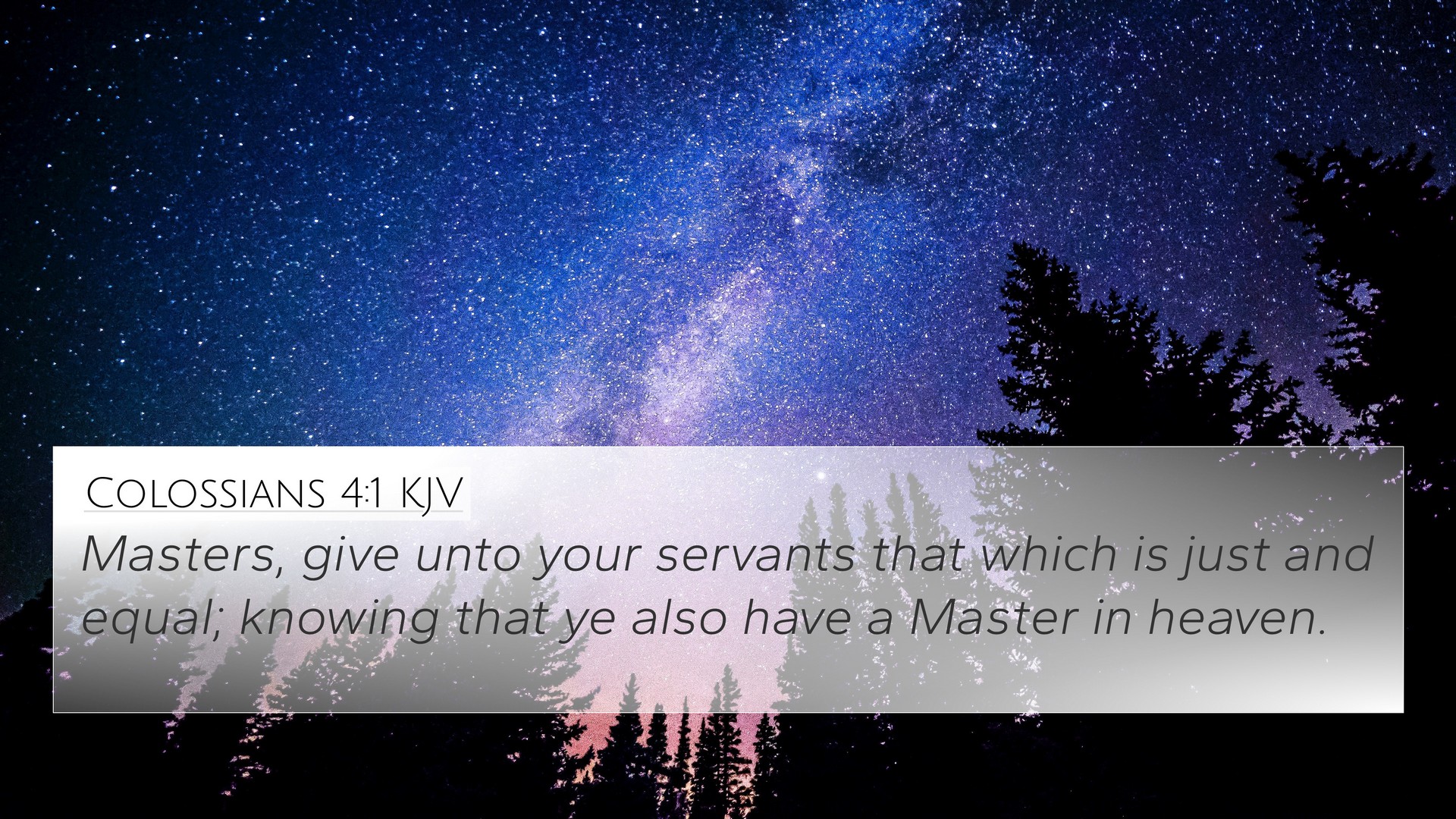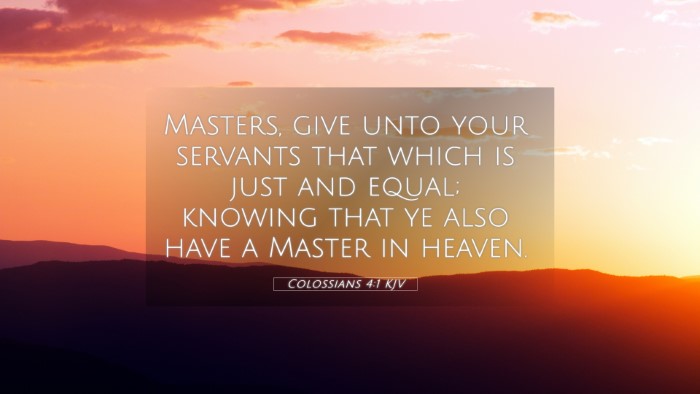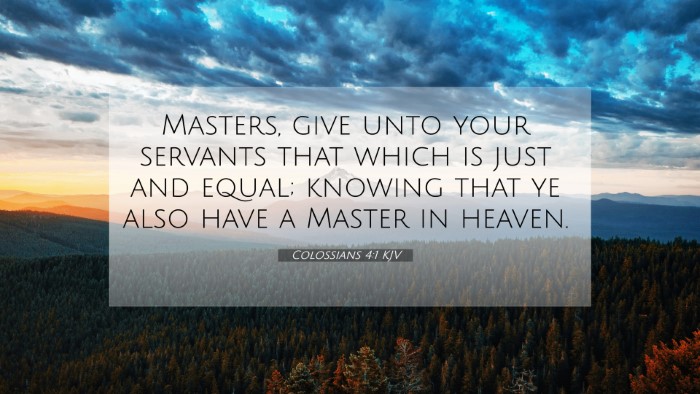Old Testament
Genesis Exodus Leviticus Numbers Deuteronomy Joshua Judges Ruth 1 Samuel 2 Samuel 1 Kings 2 Kings 1 Chronicles 2 Chronicles Ezra Nehemiah Esther Job Psalms Proverbs Ecclesiastes Song of Solomon Isaiah Jeremiah Lamentations Ezekiel Daniel Hosea Joel Amos Obadiah Jonah Micah Nahum Habakkuk Zephaniah Haggai Zechariah MalachiColossians 4:1 Similar Verses
Colossians 4:1 Cross References
Masters, give unto your servants that which is just and equal; knowing that ye also have a Master in heaven.
Uncover the Rich Themes and Topics of This Bible Verse
Listed below are the Bible themes associated with Colossians 4:1. We invite you to explore each theme to gain deeper insights into the Scriptures.
Colossians 4:1 Cross Reference Verses
This section features a detailed cross-reference designed to enrich your understanding of the Scriptures. Below, you will find carefully selected verses that echo the themes and teachings related to Colossians 4:1 KJV. Click on any image to explore detailed analyses of related Bible verses and uncover deeper theological insights.
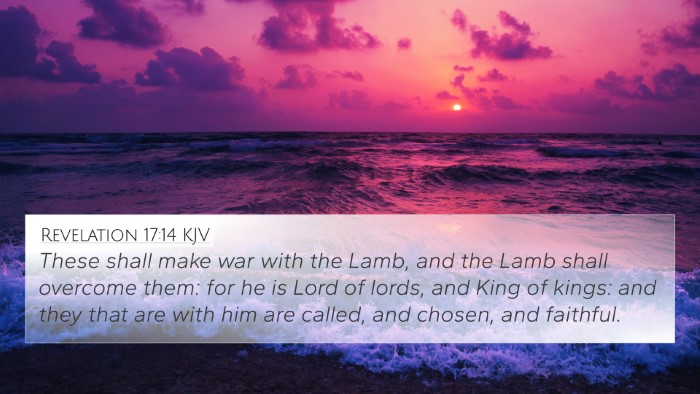
Revelation 17:14 (KJV) »
These shall make war with the Lamb, and the Lamb shall overcome them: for he is Lord of lords, and King of kings: and they that are with him are called, and chosen, and faithful.

Ephesians 6:8 (KJV) »
Knowing that whatsoever good thing any man doeth, the same shall he receive of the Lord, whether he be bond or free.
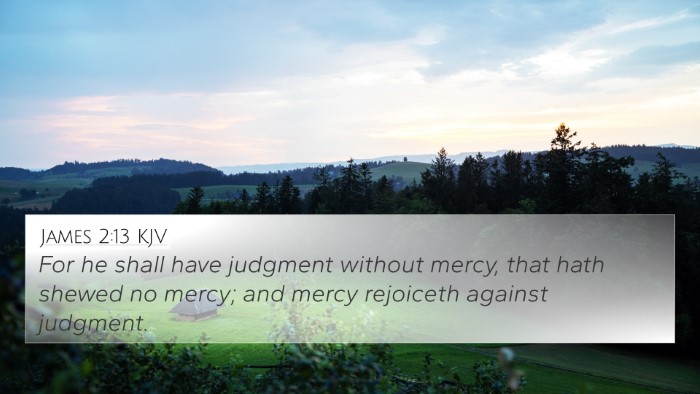
James 2:13 (KJV) »
For he shall have judgment without mercy, that hath shewed no mercy; and mercy rejoiceth against judgment.
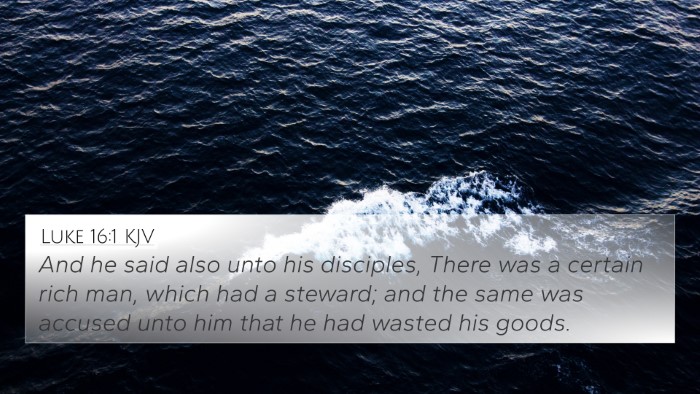
Luke 16:1 (KJV) »
And he said also unto his disciples, There was a certain rich man, which had a steward; and the same was accused unto him that he had wasted his goods.
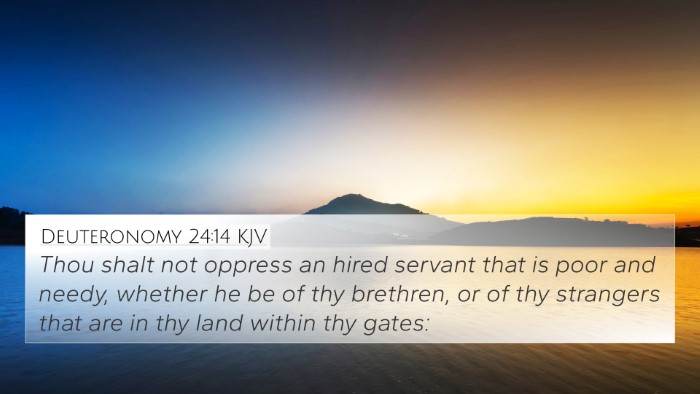
Deuteronomy 24:14 (KJV) »
Thou shalt not oppress an hired servant that is poor and needy, whether he be of thy brethren, or of thy strangers that are in thy land within thy gates:
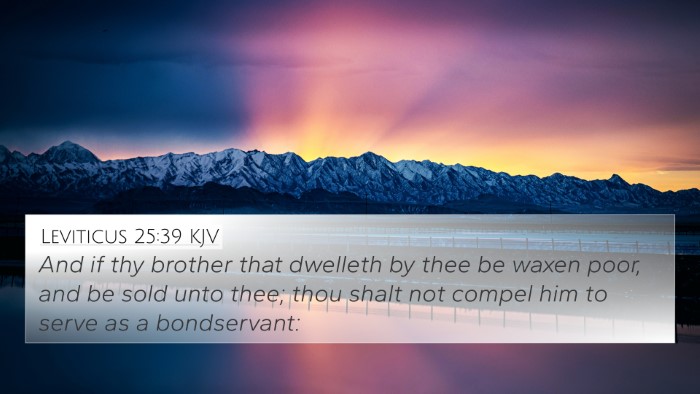
Leviticus 25:39 (KJV) »
And if thy brother that dwelleth by thee be waxen poor, and be sold unto thee; thou shalt not compel him to serve as a bondservant:
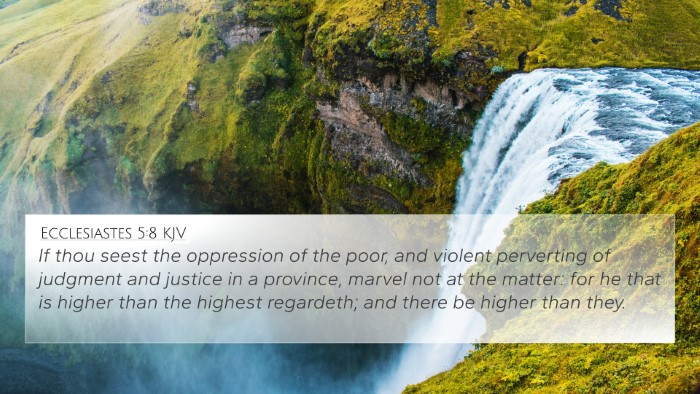
Ecclesiastes 5:8 (KJV) »
If thou seest the oppression of the poor, and violent perverting of judgment and justice in a province, marvel not at the matter: for he that is higher than the highest regardeth; and there be higher than they.
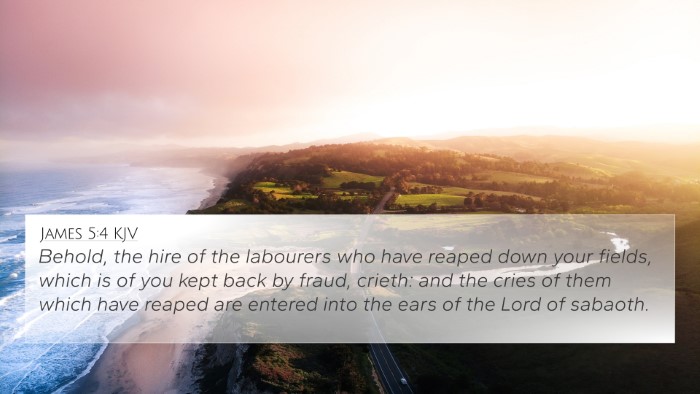
James 5:4 (KJV) »
Behold, the hire of the labourers who have reaped down your fields, which is of you kept back by fraud, crieth: and the cries of them which have reaped are entered into the ears of the Lord of sabaoth.

Revelation 19:16 (KJV) »
And he hath on his vesture and on his thigh a name written, KING OF KINGS, AND LORD OF LORDS.

Matthew 24:48 (KJV) »
But and if that evil servant shall say in his heart, My lord delayeth his coming;

Luke 19:15 (KJV) »
And it came to pass, that when he was returned, having received the kingdom, then he commanded these servants to be called unto him, to whom he had given the money, that he might know how much every man had gained by trading.

Malachi 3:5 (KJV) »
And I will come near to you to judgment; and I will be a swift witness against the sorcerers, and against the adulterers, and against false swearers, and against those that oppress the hireling in his wages, the widow, and the fatherless, and that turn aside the stranger from his right, and fear not me, saith the LORD of hosts.
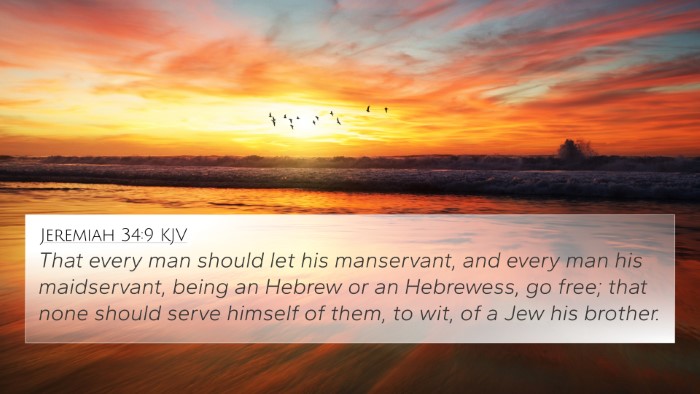
Jeremiah 34:9 (KJV) »
That every man should let his manservant, and every man his maidservant, being an Hebrew or an Hebrewess, go free; that none should serve himself of them, to wit, of a Jew his brother.
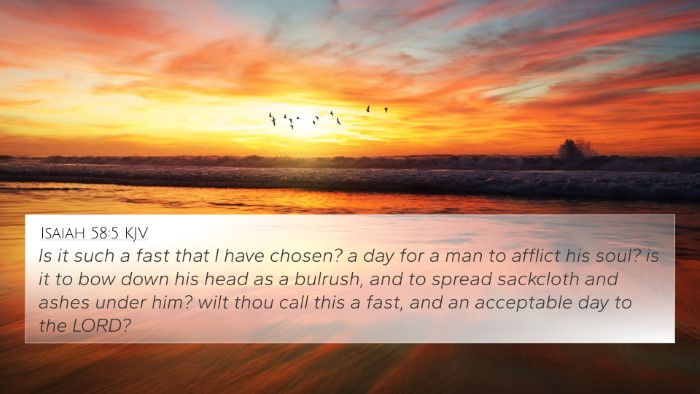
Isaiah 58:5 (KJV) »
Is it such a fast that I have chosen? a day for a man to afflict his soul? is it to bow down his head as a bulrush, and to spread sackcloth and ashes under him? wilt thou call this a fast, and an acceptable day to the LORD?

Job 31:13 (KJV) »
If I did despise the cause of my manservant or of my maidservant, when they contended with me;

Job 24:11 (KJV) »
Which make oil within their walls, and tread their winepresses, and suffer thirst.
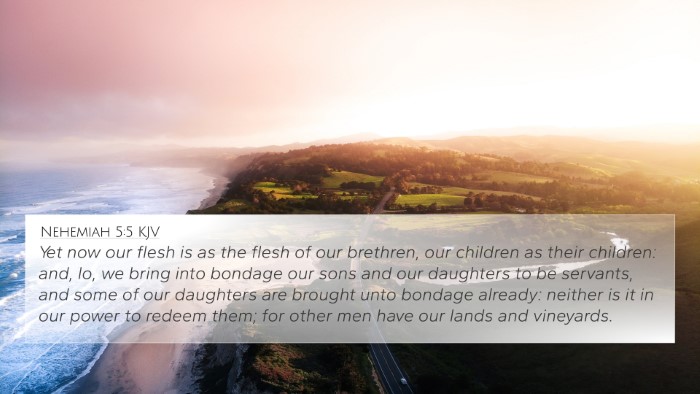
Nehemiah 5:5 (KJV) »
Yet now our flesh is as the flesh of our brethren, our children as their children: and, lo, we bring into bondage our sons and our daughters to be servants, and some of our daughters are brought unto bondage already: neither is it in our power to redeem them; for other men have our lands and vineyards.
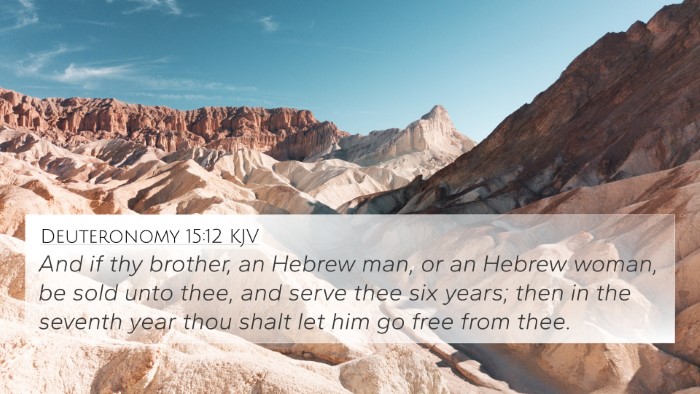
Deuteronomy 15:12 (KJV) »
And if thy brother, an Hebrew man, or an Hebrew woman, be sold unto thee, and serve thee six years; then in the seventh year thou shalt let him go free from thee.
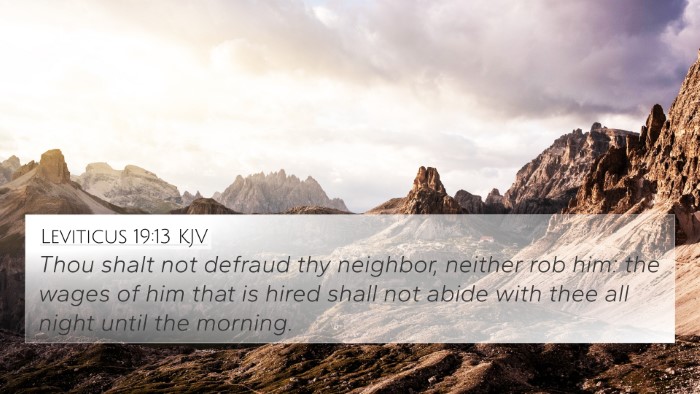
Leviticus 19:13 (KJV) »
Thou shalt not defraud thy neighbor, neither rob him: the wages of him that is hired shall not abide with thee all night until the morning.

Matthew 23:8 (KJV) »
But be not ye called Rabbi: for one is your Master, even Christ; and all ye are brethren.

Isaiah 58:3 (KJV) »
Wherefore have we fasted, say they, and thou seest not? wherefore have we afflicted our soul, and thou takest no knowledge? Behold, in the day of your fast ye find pleasure, and exact all your labours.
Colossians 4:1 Verse Analysis and Similar Verses
Understanding Colossians 4:1
Colossians 4:1 states: "Masters, give unto your servants that which is just and equal; knowing that ye also have a Master in heaven." This verse addresses the responsibilities of those in authority, specifically masters or employers, emphasizing the principles of justice and equity in their treatment of subordinates.
Summary of the Verse Meaning
The apostle Paul calls upon masters to exercise fairness and justice towards their servants, reminding them that they too are accountable to a higher authority in heaven. The verse reflects a broader biblical principle that promotes ethical conduct in all relationships, particularly in the context of work and authority.
Insights from Public Domain Commentaries
Matthew Henry's Commentary
According to Matthew Henry, this verse emphasizes the reciprocal duty of masters to treat their servants with fairness. Henry notes that this teaching aligns with the ethical dimensions of Christian living. He suggests that true Christian leadership is characterized by humility and fairness, and that the acknowledgment of a divine Master imposes a moral obligation to act justly.
Albert Barnes' Notes
Albert Barnes highlights that the instruction to give what is just and equal implies the necessity for masters to recognize their duties towards their servants. He explains that this guidance is rooted in the understanding that all individuals, regardless of their social status, are ultimately accountable to God. The expectation of equity serves as a means of promoting genuine respect and dignity within the master-servant relationship.
Adam Clarke's Commentary
Adam Clarke underlines the importance of the term “just and equal” in this context. He elaborates that masters should not take advantage of their position but instead treat their servants in a manner that reflects fairness and justice. Clarke further comments that the reminder of a Master in heaven acts as a means of accountability and moral guidance for those in charge.
Thematic Connections and Cross-References
Colossians 4:1 can be cross-referenced with the following Bible verses that provide similar teachings or insights regarding authority, servitude, and justice in relationships.
- Ephesians 6:9: "And, ye masters, do the same things unto them, forbearing threatening: knowing that your Master also is in heaven; neither is there respect of persons with him."
- James 5:4: "Behold, the hire of the laborers who have reaped down your fields, which is of you kept back by fraud, crieth: and the cries of them which have reaped are entered into the ears of the Lord of sabaoth."
- 1 Timothy 6:1: "Let as many servants as are under the yoke count their own masters worthy of all honor, that the name of God and his doctrine be not blasphemed."
- 1 Peter 2:18: "Servants, be subject to your masters with all fear; not only to the good and gentle, but also to the froward."
- Luke 12:48: "For unto whomsoever much is given, of him shall be much required: and to whom men have committed much, of him they will ask the more."
- Proverbs 12:10: "A righteous man regardeth the life of his beast: but the tender mercies of the wicked are cruel."
- Colossians 3:25: "But he that doeth wrong shall receive for the wrong which he hath done: and there is no respect of persons."
Applying the Teachings of Colossians 4:1
In light of Colossians 4:1, it is essential for those in positions of authority to approach their roles with a sense of responsibility and fairness. This verse encourages leaders to foster a work environment where justice prevails, reflecting biblical values of love and respect for one another.
Conclusion
Colossians 4:1 presents a relevant message for both employers and employees, urging them to engage in equitable practices and to remember their accountability before God. This parallelism highlights the interconnectedness of biblical teachings, making it vital to consider how various scriptures complement one another in illuminating God’s design for human relationships.
